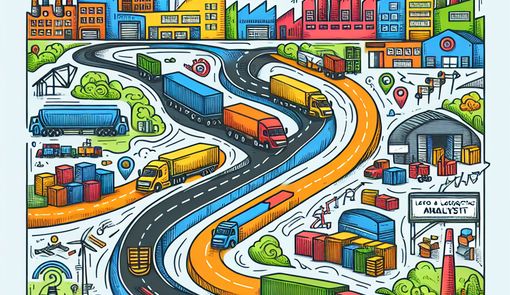Logistics Analyst
A Logistics Analyst is responsible for analyzing and coordinating an organization's supply chain. They manage the entire life cycle of a product, from acquisition to distribution, and optimize the flow of goods to ensure efficiency.

Top Articles for Logistics Analyst
Sample Job Descriptions for Logistics Analyst
Below are the some sample job descriptions for the different experience levels, where you can find the summary of the role, required skills, qualifications, and responsibilities.
Junior (0-2 years of experience)
Summary of the Role
A Junior Logistics Analyst is responsible for helping to manage the supply chain process, analyze logistics data, and suggest improvements for efficiency. The role requires a detail-oriented individual interested in the processes and systems used to track the movement of goods from suppliers to customers.
Required Skills
- Data analysis
- Supply chain management
- Communication
- Problem-solving
- Time management
- Attention to detail
- Proficiency in logistics software
Qualifications
- Bachelor's degree in supply chain management, logistics, business administration, or relevant field.
- Understanding of logistics principles and supply chain management.
- Proficiency with Microsoft Office Suite, particularly Excel.
- Strong analytical and problem-solving skills.
- Excellent communication and teamwork abilities.
Responsibilities
- Assist in analyzing logistics data to identify trends, patterns, and areas for improvement.
- Support the logistics team in managing the supply chain process, including inventory tracking, shipment scheduling, and order fulfillment.
- Assist in developing logistics plans and strategies to improve cost-efficiency and delivery performance.
- Coordinate with suppliers, carriers, and warehouse staff to ensure smooth operations.
- Prepare regular reports on logistics performance and present findings to management.
- Participate in the implementation of new logistics software or processes.
- Help in troubleshooting logistics issues and providing solutions.
- Contribute to the maintenance of logistics documentation and records.
Intermediate (2-5 years of experience)
Summary of the Role
The Logistics Analyst is responsible for analyzing and coordinating the supply chain for an organization. This individual ensures efficient delivery of goods and services by analyzing logistical functions, managing logistics operations, and optimizing logistical processes. The ideal candidate will have expertise in data analysis, supply chain management, and process improvement to ensure that products move efficiently from the supplier to the customer.
Required Skills
- Analytical and critical thinking skills
- Proficiency in data analysis and reporting
- Strong communication and collaboration skills
- Time management and organizational abilities
- Expertise with logistics and supply chain software tools
- Ability to work in a fast-paced and dynamic environment
- Adaptability to respond quickly to changing demands
Qualifications
- Bachelor's degree in Supply Chain Management, Logistics, Business Administration, or a related field.
- 2-5 years of experience in logistics, supply chain management, or analytics.
- Knowledge of logistics software and databases (e.g., ERP, TMS).
- Familiarity with logistics and supply chain management processes.
- Strong understanding of regulatory requirements affecting shipping and logistics.
- Excellent analytical and problem-solving skills.
- Proven track record of managing logistics operations and improving processes.
Responsibilities
- Analyze logistics data to identify trends, patterns, and areas for improvement.
- Collaborate with supply chain partners to improve logistics processes and reduce costs.
- Develop and maintain logistics performance metrics and dashboards.
- Ensure compliance with local, state, and federal regulations regarding transportation and logistics.
- Suggest solutions to manage any logistics-related issues or delays.
- Implement new technologies and methodologies to improve logistics operations.
- Coordinate with different departments, such as procurement and warehousing, to align logistics strategies.
- Manage logistics aspects of import/export activities including customs and shipping.
- Prepare and present reports on logistics performance to management.
Senior (5+ years of experience)
Summary of the Role
As a Senior Logistics Analyst, you will take on a crucial role within the supply chain management, overseeing the entire life cycle of a product from acquisition to distribution. You will analyze and coordinate the logistical functions of the company, ensuring the efficient and cost-effective flow of goods. This position requires a seasoned professional with extensive experience in logistics, supply chain management, and data analysis.
Required Skills
- Advanced analytical and problem-solving skills.
- Expertise in Supply Chain Management (SCM) software, such as SAP SCM, Oracle SCM, etc.
- Knowledge of statistical analysis software and databases.
- Proficiency in Microsoft Office Suite, particularly Excel.
- Strong organizational and time management skills.
- Ability to work under pressure and meet tight deadlines.
- Attention to detail and commitment to accuracy.
Qualifications
- Bachelor's degree in Logistics, Business Administration, or a related field.
- 5+ years of experience in logistics or supply chain management.
- Proven experience in data mining, analysis, and reporting.
- Familiarity with logistics and inventory management software.
- Strong leadership and decision-making skills.
- Excellent communication and interpersonal skills.
- Project management experience.
Responsibilities
- Analyze data to identify trends and resolve performance issues within the supply chain.
- Develop and implement logistics plans that may affect the production, distribution, and inventory of finished products to enhance product flow.
- Coordinate with suppliers, manufacturers, and retailers to ensure timely delivery of products.
- Lead the logistics team in managing inventory control processes.
- Design strategies to minimize the cost or time required to transport goods.
- Review logistics performance with customers against targets, benchmarks, and service agreements.
- Develop and maintain analytical tools and software to improve logistical operations.
- Stay current with advances in logistics technology and apply new ways of optimizing logistical procedures.
See other roles in Consumer Services and Public Sector and Transportation






